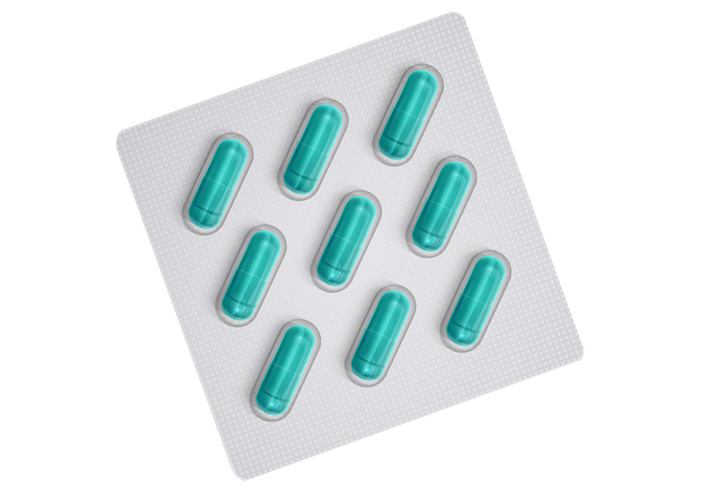Cleocin
Cleocin is a medicine for the treatment of bacterial infectious diseases. Its active ingredient is clindamycin. As clindamycin is not related to penicillin or its derivatives, this antibiotic may be used in patients with a hypersensitivity (allergy) to penicillin.
On doctor's prescription, Cleocin is used in the treatment of various infectious diseases caused by bacteria, such as:
Respiratory tract, lung and ENT infections (e.g. pharyngitis, tonsillitis, pneumonia, otitis media, sinusitis, scarlet fever, bronchitis); skin and soft tissue infections (e.g. abscesses, boils, wound infections, acne); bone and joint infections; infections of the female genital organs; infections of the teeth and gums.
What Does Cleocin Contain?

Active ingredients
1 capsule contains 150 mg or 300 mg of clindamycin as clindamycin hydrochloride.
Excipients
Pregelatinised maize starch, talc, magnesium stearate, lactose monohydrate, gelatin, titanium dioxide (E171), yellow, red and black iron oxide (E172).
Forms and Strengths
Cleocin 150 mg: 16 capsules.
Cleocin 300 mg: 16 capsules.
Uses
Depending on the severity of the infection, the doctor will determine the dosage and duration of treatment.
For adults, the daily dose is generally between 600 and 1800 mg.
Capsules are not suitable for treating children.
The capsules can be taken independently of meals and should be swallowed with a glass of water.
Cleocin capsules are not suitable for children who are not yet able to swallow the capsules whole. If it is not possible to administer an accurately calculated dose in mg/kg with the capsules, another galenic form should be used.
Antibiotic therapy must be continued for the full duration prescribed by the doctor. Symptoms of the disease often subside before the infection is fully treated. Insufficient duration of administration or early cessation of treatment may cause the disease to flare up again.
Do not change the prescribed dosage or duration of treatment on your own initiative. Contact your doctor or pharmacist if you feel that the drug is too weak or too strong.
Side Effects
Common (affects 1 to 10 people in 100)
The most common side effects are skin rashes; other common side effects are certain changes in the blood count (known as eosinophilia and requiring medical examination), diarrhoea and disturbances in liver function. These side effects may occur during treatment with the antibiotic or only 2 to 3 weeks later. In the event of severe and persistent diarrhoea, associated with abdominal cramps and fever, the drug should be stopped and the treating doctor consulted immediately.
Inflammation of the large intestine has also been frequently observed.
Occasional (affects 1 to 10 people in 1000)
Abdominal pain, nausea, vomiting, taste disorders, low blood pressure, cardiac and respiratory disorders and urticaria have occasionally been reported.
Rare (affecting 1 to 10 people in 10,000)
Changes in blood count, accumulation of fluid in the skin, vaginal inflammation, as well as itching, hypersensitivity reactions and severe skin reactions.
Very rare (affects less than one person in 10,000)
Liver inflammation, joint pain.
Unknown frequency (cannot be estimated on the basis of available data)
Acute kidney damage, allergic reactions, hypersensitivity reactions and severe skin reactions (exanthematous pustulosis, DRESS syndrome), jaundice, headache, dizziness, sleepiness, inflammation of the oesophagus, intestinal inflammation (Clostridium difficile colitis).
If you notice a build-up of fluid leading to swelling of the legs, ankles or feet, shortness of breath or nausea, tell your doctor immediately.
At the first signs of an allergic reaction to Cleocin (e.g. reddening of the skin, rash with blistering, swelling of the face, skin or mucous membranes, respiratory distress), stop taking it immediately and contact a doctor without delay.
If you notice any side effects, please inform your doctor or pharmacist. This applies in particular to side effects not mentioned in this package leaflet.
Precautions
Cleocin should be used with caution in patients with serious liver, kidney or gastrointestinal disorders, in patients with impaired signal transmission between nerves and muscles (e.g. Parkinson's disease or myasthenia gravis, a muscle-weakening disease) and in patients with bronchial asthma. Medicines that inhibit intestinal peristalsis (movement of the intestine) should not be taken in cases of diarrhoea.
Acute kidney damage may occur during treatment with Cleocin, including acute renal failure. Please tell your doctor about all the medicines you are currently taking and about any kidney problems you may have. If you notice a decrease in urine output, swelling in your legs, ankles, or feet, shortness of breath, or nausea, it's important to get in touch with your doctor right away.
In rare cases, severe skin reactions have been observed during treatment with clindamycin. If you experience any signs of an allergic reaction such as skin redness, rash with blistering, swelling of the face, skin, or mucous membranes, or difficulty breathing, stop taking Cleocin immediately and seek medical attention right away.
Medicinal products containing other antibacterial active ingredients (e.g. erythromycin) may influence the effect of Cleocin and should not therefore be used simultaneously.
The simultaneous use of Cleocin and medicinal products containing rifampicin, another antibacterial active substance, may strongly affect the efficacy of Cleocin. If possible, the simultaneous use of these two medicines should therefore be avoided.
If medicines containing acenocoumarol or other similar anticoagulants are taken at the same time, the risk of bleeding may increase. Regular blood tests may be necessary to monitor coagulation capacity.
Certain other medicines may also affect the effectiveness of Cleocin.
Each capsule of Cleocin contains lactose (milk sugar); patients with galactose or lactose intolerance or glucose-galactose malabsorption should not take this medicine.
If your doctor has told you that you are intolerant to certain sugars, contact your doctor before taking these medicines.
What else do you need to consider?
This medicine has been prescribed for you by your doctor for the treatment of your current condition.
The antibiotic clindamycin contained in Cleocin does not act against all microorganisms that cause infectious diseases. Using the wrong medicine or the wrong dose can cause complications. Never use it to treat other illnesses or other people.
When should Cleocin not be used?
Drug should not be taken in the presence of known or suspected hypersensitivity (allergy) to clindamycin or lincomycin.
Pregnancy and Breastfeeding
In principle, Cleocin should not be used during pregnancy unless specifically prescribed by a doctor.
You should not breast-feed while taking Cleocin. If necessary, breast-feeding should be stopped or the milk should be pumped and discarded while this drug is being used.



